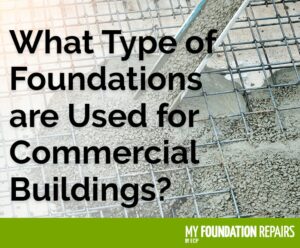What Type of Foundations are Used for Commercial Buildings?
When it comes to foundations, commercial foundations rely on elements like soil conditions and construction size as much as residential foundations. Where the two differ, however, is when you begin to factor in load-bearing capacity. Commercial foundations are the most important part of a structure because a commercial foundation needs to be able to provide maximum stability for the building.
Commercial foundations have to deal with a variety of structural elements, such as dead loads i.e. walls, floors, and ceilings; live loads i.e. loads that change in position and magnitude, such as people or vehicles; and environmental loads i.e. strong winds, frequent hurricanes, or frequent freezing temperatures. If you’re beginning work on a commercial foundation project, there are a few different commercial foundation types to consider, as well as different types of commercial foundation repair available depending on the chosen foundation type.

What Types of Foundations are Used for Commercial Buildings?
Piles
There are two types of commercial foundations: deep and shallow foundations. A pile foundation is a deep foundation because it reaches deep into the ground, through unstable soil, to rest on the rock below. Piles look like long cylinders or columns made out of concrete or steel. These piles are designed to transfer the load of the building at the desired depth by end-bearing. Piles are ideal for situations where there is a change of high water content in the soil, such as a high groundwater table or a nearby drainage system. Piles also work in cases where live loads may be heavier or not as uniformly distributed.
T-Shaped Foundations
A t-shaped foundation is ideal in environments where the ground frequently experiences freezes. The concrete footings rest just below the frost line and then walls are built on top of those footings to extend past the surface of the soil. Taller structures in areas where the ground is more likely to freeze use t-shaped foundations because the foundation helps to evenly distribute pressure from frozen soil.
Spot Footing
Spot footing, or continuous footing, is a type of shallow foundation that is commonly used for commercial foundations. The footing carries columns or grade beams to distribute the structural load into the soil around the building’s foundation. Spot footing supports a single point of contact, like a beam or post. Materials like concrete and rebar are often used to reinforce the foundation and help it carry more weight.
Spread Footing (Individual Footing)
Spread footing is designed to support foundations where the base of the foundation is wider than the top. Spread footing is built with concrete and rebar and performs better than other spot footings because they “spread” the weight of the foundation out over a large surface area.
Mat Foundation
Mat foundations are another type of shallow foundation. This foundation is also called a raft foundation and is most commonly used when the soil beneath the foundation has a low load-bearing capacity. The mat foundation spreads out the building’s weight – dead and live loads – and evenly distributes the weight of the structure across a greater surface area. This foundation is engineered to float the entire building at ground level as the whole foundation works similarly to a concrete slab foundation.
Slab Foundation with Grade Beams
A slab foundation, or a slab-on-grade foundation, is a choice often used for commercial buildings because it’s an economical choice. Grade beams, reinforcements, and castings are all pored together with the concrete slab to support the building’s walls with a uniformed load. This foundation type is seen more often in areas where the ground is less likely to freeze.
Commercial Foundation Repair Options for Your Building
Varying types of commercial foundations means that there’s more than one type of commercial foundation repair depending on the issue you’re having with your building’s foundation. Foundation problems can present themselves in a variety of ways, including slab cracks, wall cracks, leaning walls, or a shifting foundation. Depending on the type of commercial foundation you have, products like helical piers and wall anchors may be installed to help stabilize your foundation so that it can withstand any external pressure.
Similarly, if you’re getting ready to start new commercial construction, consider new construction piers to help prevent the need for commercial foundation repair before it even starts. We’re happy to help advise on the best course of action to ensure that your building is built to last!
Contact My Foundation Repairs today to get started on your commercial foundation repair. We can assess your building’s foundation problems and help you decide the best course of action.
Recommended Blog Posts
Foundation Failure: Recognizing Signs for a Solid Home
01/27/2024
Foundation Settlement and Sinking, Residential Foundation Repair
The Secrets of Foundation Failure: How to Recognize Signs and Ensure a Solid Home Understanding Foundation Failure Your home’s foundation is its bedrock, and when issues arise, it can be a source of frustration and financial strain. Recognizing the causes and early signs is crucial for homeowners. Professionals in the foundation repair industry can help […]
How to Determine Foundation Repair Cost
01/27/2024
Foundation Repair, Residential Foundation Repair
How to Determine Foundation Repair Cost Foundation repair costs can vary significantly, making it challenging to estimate without assessing the situation. Each repair scenario has unique nuances that a professional must consider before providing an accurate estimate. 4 Things That Help Determine the Price Supplies Needed: The number and type of supplies majorly affect repair […]
How to Safeguard Your Home Improvement: Avoiding Scams and Ensuring Success
12/27/2023
Finding a Foundation Contractor
How to Safeguard Your Home Improvement: Avoiding Scams and Ensuring Success Embarking on a home improvement project? Learn crucial steps to safeguard yourself from scams and guarantee a successful journey from start to finish. Smart Initiatives for a Seamless Start Crafting a Foolproof Contract: Ensure the success of your project with a detailed written contract […]
